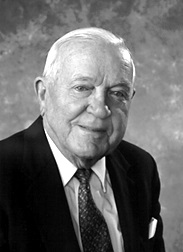In Memoriam: Alexander N. Charters
 Alexander N. Charters (1916-2018) died in August 2018. Dr. Charters was an internationally-recognized American expert in the field of adult and continuing education.
Alexander N. Charters (1916-2018) died in August 2018. Dr. Charters was an internationally-recognized American expert in the field of adult and continuing education.
Dr. Charters was born in Verdant Valley, Alberta, Canada in 1916. He earned a B.A. in history and English from the University of British Colombia in 1938, and a Ph.D. in adult education from the University of Chicago in 1948. Dr. Charters’ aunt and uncle were both active in the adult education field, and reading material they provided while he was serving in the Canadian Navy sparked Dr. Charters’ interest in the field. In 1948, Dr. Charters was appointed Assistant to the Dean of University College at Syracuse University, beginning his career in the field of adult education. He subsequently served Syracuse University in numerous roles, including Dean of University College (1952-1964) and Vice President for Continuing Education (1964-1973).
Dr. Charters was very involved with UPCEA (then NUEA), and served as the association’s president for the 1965-66 term. Dr. Charters’ work and influence are still felt in the association to this day, as described by UPCEA CEO Bob Hansen at UPCEA’s 100th Annual Conference in 2015:
The next major inflection point for the association was precisely 50 years after the first conference in Madison.
Remarkably, the man who was at the center of that story is in the room with us today, Alex Charters, dean emeritus at Syracuse University and former president of the association.
At the 50th golden anniversary conference at Purdue in 1965, President Charters announced “discussions involving the establishment of a Washington office.”
A formal report on the matter argued that a professional staff headquartered in Washington could serve as a vital link between universities, the federal government, and other major associations.
In March 1966, President Charters announced the appointment of the association’s first Executive Director, and a motion was passed to establish a Washington Office.
We opened an office on Massachusetts Avenue later that year, and subsequently moved to the new National Center for Higher Education, better known by its iconic address, One Dupont Circle—or simply “One Dupont”—a name that has become synonymous with higher education policy in the U.S.
The modern era of the association had begun.
Other UPCEA Updates + Blogs
Microcredentials, Modularity, and Mission: Insights from UPCEA’s Coffee Chat on Innovation in Healthcare Education
In partnership with the HELIX Summit on Continuing Medical Education How are institutions navigating the dynamic intersection of workforce demands,…
Leading with Values-Based Influence in Higher Education
Why Values-Based Influence Matters Now Higher education is undergoing seismic shifts—demographic changes, budget constraints, AI disruption, and questions of relevance.…


